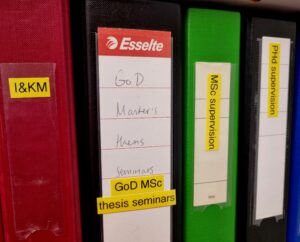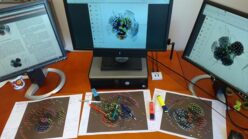Writing a Master’s thesis varies a lot from country to country, university to university, faculty to faculty, discipline to discipline, and supervisor to supervisor.

I am fortunate to have experienced the Portuguese, the French, the Dutch and the Finnish way of writing a Master’s thesis as a Erasmus Mundus student. I still remember that a Master’s thesis at a business school can be very different from place to place. Some are more oriented towards practice and act almost like an internship or action report, others are more oriented towards making a theoretical contribution to the existing scientific literature. Writing a thesis at a Finnish business school is more of the latter – therefore much of the student efforts are concentrated on reviewing the literature, and somehow extend it by scientific manners. The use of in-line citations, and a comprehensive reference list are expected – all in a congruent citation style.
At the Faculty of Social Sciences, Business and Economics, and Law (FSEJ) of Åbo Akademi, it is well documented in the evaluation criteria that you are expected to:
- Formulate a topic and motivate it in relation to the existing literature;
- Formulate the aim and research question(s);
- Identify, evaluate and review relevant literature;
- Chose a research method and argue for its choice;
- Independently apply the chosen method to create new knowledge;
Note that while on 1, 2, 3 and 4 the literature is your main point of departure, in 5 you are supposed to contribute back to literature. Corroborating, extending or criticizing extant theory are all good and welcomed contributions to a Master thesis.
For the ones starting the Master’s thesis process, the task seems daunting – after all many master theses take years to be completed (note this is exceptional, not the most common way). After supervising some master’s thesis at Turku University and Åbo Akademi, I would like to point out some misconceptions that will ease the life of the ones starting the Master’s thesis process at a Finnish Business school. Please note these are my own views and my own takes. They approximate the views of my colleagues supervising Master’s thesis at the Information Studies unit @ Åbo Akademi where I work – so take everything with a grain of salt and clarify pending issues with your own supervisor.
First misconception – You need to collected your own data
The first false assumption that students often take is that they need to provoke research data. To my view this is false. While collecting your own data from scratch is a merit, finding and combining research data collected by others can be a merit as well.
For example, Statistics Finland produces official statistics on Finnish society as well as Eurostat does the same at the European Union level that are often used in Master’s theses from public administration to national economics. If you are more into qualitative research, you can turn to the Finnish Social Science Data Archive which provides access to a wide range of digital research data or search for equivalent organizations in other EU countries.
It’s rare, but it is possible to buy data-sets, or pay somebody to collect data on your behalf or simply source it in a crowdsourcing platform. I discorate all these ways of getting data, as a master thesis should be a very individual project where both theory and your own “brain” should shape the data collection and analysis.
You do not always need to provoke your own data (e.g., experiments, surveys or interviews). There is so much naturally occurring digital trace data by publicly available data on the Internet these days. For example, you can study collaboration in open-source communities, study information contagions on Twitter, study the bidding mechanisms for ads on YouTube, study the evolution of co-citation networks in a given discipline, among many other things by simply leveraging data that already exists on the Internet.
In addition, please do not disregard the use of archives. For example, the Åbo Akademi University Library has an outstanding archive of documentation that goes back centuries. You can do a thesis on Finance by analyzing newspaper ads by banks in old newspapers, you can do a thesis on public administration by analyzing the evolution of old policy guidelines, or you can do research in information studies by reporting on how the library itself organizes its historical and cultural heritage.
Finally, I must remark that it is easier to collect and analyse your data than to grab large unstructured or undocumented data sets from the Internet. As you collect your data, you are at the same learning from it and getting familiar with it. Furthermore, data collection is often a creative process. You can do it in a “social” oriented way by conducting interviews or designing an online form to collect data from a targeted social group. You can also be more technical-oriented by screen-scrapping Internet pages, getting data via APIs (e.g., SOAP, REST, and GraphQL among other ways), or combining several data sets into a single curated one. Both social and technical-oriented skills can be valued by future employers.
Second misconception – You need to collect either interview or survey data
The second false assumption that students often make is that they need to either collect data via interviews or via a survey questionnaire.
While it might be true that those are the most common methods to collect data for a Master’s thesis at a business school, there are many other things you can do.
- Experiments – Not necessary in a laboratory, but behavioral experiments in a group like in experimental economics research. See https://news.uchicago.edu/explainer/what-is-behavioral-economics for more information.
- Social network analysis – It’s my favorite, rather than studying text (qualitative) or studying numbers (quantitative) you study relationships between social networks. There are plenty of theories and methods that allow you to visualize or test theory on how social networks evolve. See https://library.oapen.org/handle/20.500.12657/58730 to know more about it.
- Action (and/or) design science – If you are taking specific actions in an organisation or society, or designing something new, you are in a good position to conduct action (and/or) design research. See https://trepo.tuni.fi/handle/10024/65385 to know more about it.
Third misconception – You need to choose a topic or a theory that is well established on the reference disciplines of your master program
The third false assumption that students often make is that they need to choose a topic or a theory that is well established on the referenced disciplines of their master program. To my view this is also false. While there would be more literature on established topics and established theories we are also looking for new things.
Regarding topics, they often address a phenomenon that requires “joint puzzle solving” efforts across different disciplines. Regarding theories, the same applies and a phenomenon might require classical or novel theories to better explain, analyze or predict a phenomenon.
Note for example the current trendy topic of digitalization. You will find research that applies theories established in economics (e.g., Transaction Costs), Marketing (e.g., Service Dominant Logic) , Information Systems (e.g., Technology Acceptance Model), or Information studies (e.g., Robson and Robinson theory) among many others. All add to each other to better understand the process of digital transformation in organizations while often calling also for newer and better theories.
However, note that the Master’s thesis process will be easier if both the student and the supervisor are aware of the same theoretical orientation. This is why at Åbo Akademi we might invite a 2nd supervisor from a different discipline to complement the master’s thesis process with complementary expertise.
Fourth misconception – You can not replicate a research question that was addressed before
The fourth false assumption that students often make is that they cannot use a research question that was addressed before.
This is a more tricky situation. Supervisors might feel that the Master’s student is reinventing the well or choosing a path of just replicating existing work . However research benefits from replication, as well. Findings grounded from an investigation on a given context might not work on other contexts. What is suggested by a given theory might not be observable in another culture, another organization, among other people, or in another time.
So, to my view, using the same research question that others used is ok if (1) some time has passed since prior research was executed or (2) it is conducted in another context.
Fifth misconception – You can not do technological oriented research
The fifth false assumption is that students need technological skills to do technologically oriented research.
To my view this is also false. Even if you don’t have the necessary technological skills to develop the technology per se, you can still contribute a lot to the development of technology.
It is trendy now to talk about Artificial Intelligence again. But do you need to code in Python or know many Machine Learning models to (1) Test AI models?, (2) Evaluate AI models?, (3) study the use of AI in organizations?, (4) Study the implications of AI for product or service design, or (5) Identify barriers to the adoption of AI in education?. I don’t think so. I think you can do research about AI or any other technology without necessarily mastering its internals. Of course you should study them and understand how they work, but if you are interested in a given technology, do not shy away from it because you are in a business school and not in an engineering school.
Sixth – You need to align with the interests of an organization.
It’s very popular across Europe for business school students to be hired (or volunteer) or write a Master’s thesis at an organization. It’s a good way of establishing social networks and entering the job market. In Finland this also happens, I was one of them as I was hired as a “thesis worker” by Nokia to work in their Next Generation Devices department. After concluding my master studies in the Netherlands I returned to Nokia where I had a great time co-developing and co-managing the Maemo and Meegio platforms. It was a good triadic relationship, Nokia was happy with my research on open-source mobile platforms, my Master’s thesis supervisors were happy with the interview data I collected as an insider in Nokia, and after all I got super happy to work at Nokia in the time they were leading the mobile devices market.
At that time, and reflecting that situation, I was serving the interests of an organization. However, in Finland, most thesis writers are not contracted or employed. Many are volunteers at organizations, and many are not in contact with a business organization at all. In that case students should turn to their own interests.
- You like theater. Do a thesis about theater (e.g., HR recruitment practices at city theatre).
- You like football. Do a thesis on trading of rights to young prospects.
- You like skiing. Do a thesis about how pro-skis introduce innovative products in the industry.
- You like reading. Do a thesis based on the archives of a museum or library nearby you.
- You like painting. Do a thesis on how the Internet changed the financial evaluation of art.
These are random ideas. But they invite you to do research on something that interests you.
As a final note, do not reinvent the wheel, but instead stand on the shoulders of others to come up with something new.

Acknowledgements to Kristina and Gunilla for providing comments on this text.
